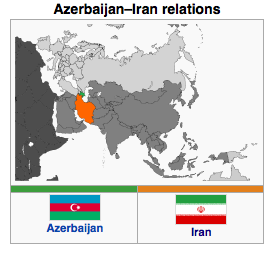Azerbaijan: Baku Wrestles With Iranian Predicament – Analysis
By Eurasianet
By Eldar Mamedov
Tension between Iran and Azerbaijan is on the rise, and policymakers in Baku need to be nimble as they manage the diplomatic challenge posed by Tehran.
Bilateral relations have been prickly for most of 2011. But they took a confrontational turn in early August, when Azerbaijani authorities put Movsum Samedov, the leader of the openly pro-Iranian Islamic Party of Azerbaijan (IPA), on trial for anti-government activity. Shortly thereafter, Gen. Hassan Firuzabadi, the chief of staff of the Iranian army, made some menacing remarks about President Ilham Aliyev’s administration in Baku. “If such a [anti-Iranian] policy continues, Aliyev will face a grim future. It will be impossible to suppress a revolt of the Aran (Azerbaijani) people,” the Mehr news agency quoted Firuzabadi as saying.

Firuzabadi’s comments were seen by Baku analysts mostly as an expression of Iranian frustration over Azerbaijan’s strong relationships with the United States and Israel. Azerbaijani officials are by no means intimidated by Firuzabadi’s tacit threat, but that doesn’t mean they are dismissing it. Many observers believe that Tehran is trying to stoke anti-Western and anti-Israeli passions among Azerbaijani believers. Many are also cognizant that Iran is feeling isolated and surrounded, and, as such, could potentially lash out at a neighbor that is perceived to be helping Tehran’s enemies.
Azerbaijan is not going to change its foreign policy to please the Islamic Republic. But it would be wise for Baku not to engage in a diplomatic tit-for-tat with Tehran. Instead, a fair trial should be accorded to Samedov and his associates arrested for “hostile activities against Azerbaijan.” This will deny the defendants a martyrs´ aura and shed the light on the nature and extent of Iran´s involvement with the IPA.
On a deeper level, Azerbaijan should take precautions to minimize vulnerabilities that can be used to undermine it from within. A more inclusive nation-building process would help. At present, Baku’s heavy emphasis on a Turkic identity has the potential to alienate Azerbaijan’s non-Turkic minorities, including the Iranian-speaking Tats and Talysh.
The death in prison of an elderly Talysh writer Novruzali Mamedov, who was accused of spying for Iran during a trial deemed unfair by human rights defenders, should serve as a wake-up call for Azerbaijani authorities. If they persist in treating every expression of Talysh nationalism as Iranian-backed separatism, it may eventually become a self-fulfilling prophecy.
Beyond the question of minority rights, shortcomings in public services, as well as widespread official corruption, present big problems. Improvements in both areas would help shield Baku from possible attempts by Tehran to meddle in Azerbaijani affairs. Highlighting one area that gives Tehran leverage, many residents of Azerbaijan’s southern regions currently go to Iran for medical treatment because they don’t need to pay bribes for an operation there.
In addition, firm, yet subtle policies towards Shia Islamic communities in Azerbaijan would deny Iran opportunities to meddle on religious grounds. Azerbaijani officials’ narrow emphasis on forceful methods in dealing with conservative believers, underscored by the hijab controversy, can be counter-productive. Taking advantage from the government’s heavy-handedness, Iranian propaganda is gaining credibility and traction among an increasing number of Azerbaijanis.
The Islamic Republic may be gone one day, but Iran will remain an influential neighbor of Azerbaijan. To forge a healthy bilateral relationship with its neighbor, Baku needs to develop a thorough understanding of the many shades and nuances of the Iranian society.
Up until now, the only Azerbaijani groups interested in Iran were either nationalists seeking “reunification with the southern Azerbaijan,” or Islamists seeking to import the Iranian system into Azerbaijan. There is an almost complete lack of interest in contacts on the level of the civil society, arts, music or literary communities, unless these are driven by an ideological agenda.
Diverging strategic interests, secular-religious tensions and unsolved minorities´ issues in both countries will continue to push Azerbaijan and Iran in opposing directions for the foreseeable future. The challenge for Azerbaijan is to avoid getting on a collision course with its powerful southern neighbor, while preserving the country’s broadly pro-Western orientation and its secular system. Azerbaijani diplomats need to be skillful and tactful to keep Iran’s penchant for making mischief in check. Bilateral relations may well get worse before they can get better.
Eldar Mamedov is a political adviser to the Socialists & Democrats Group in the European Parliament, who writes in his personal capacity.
